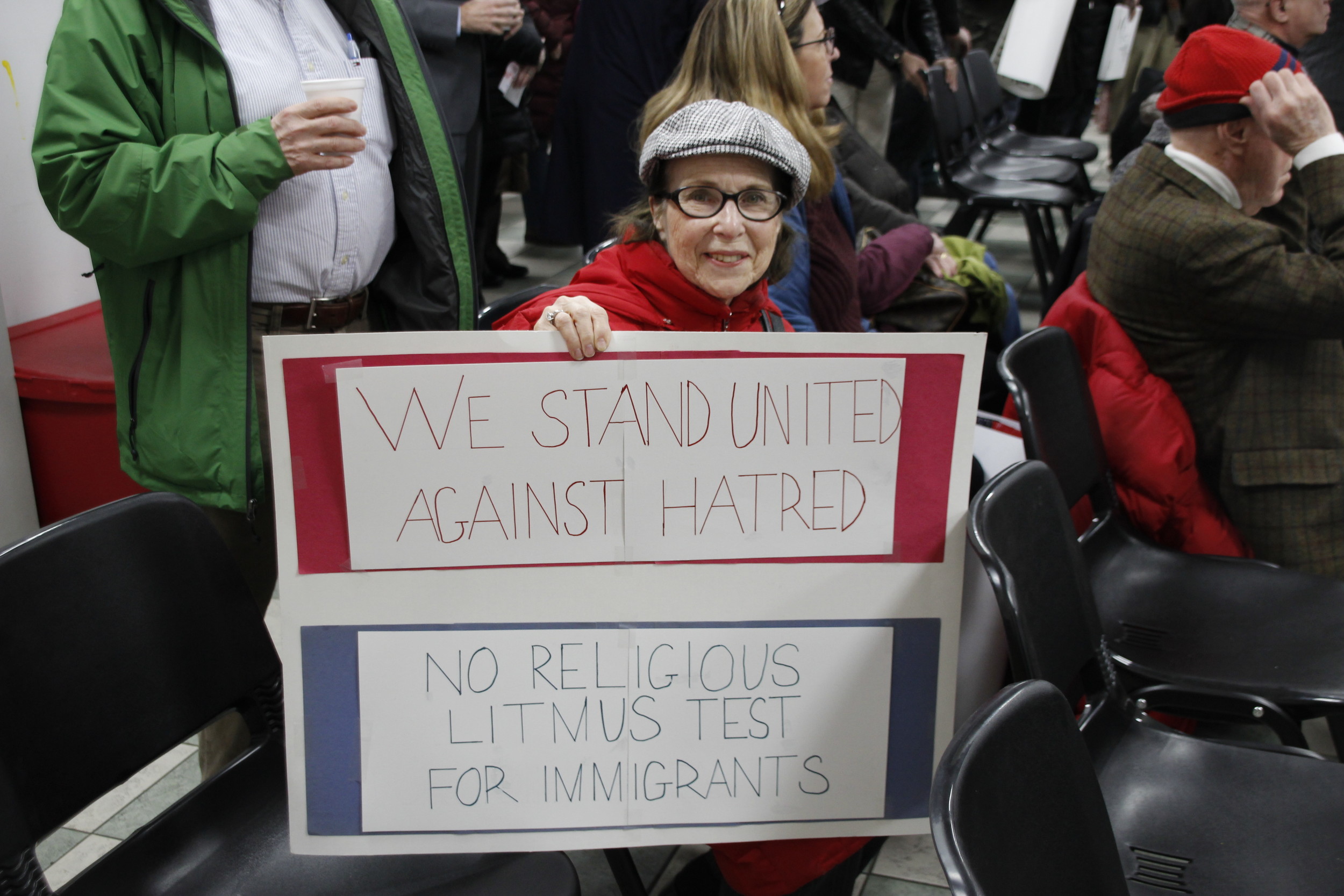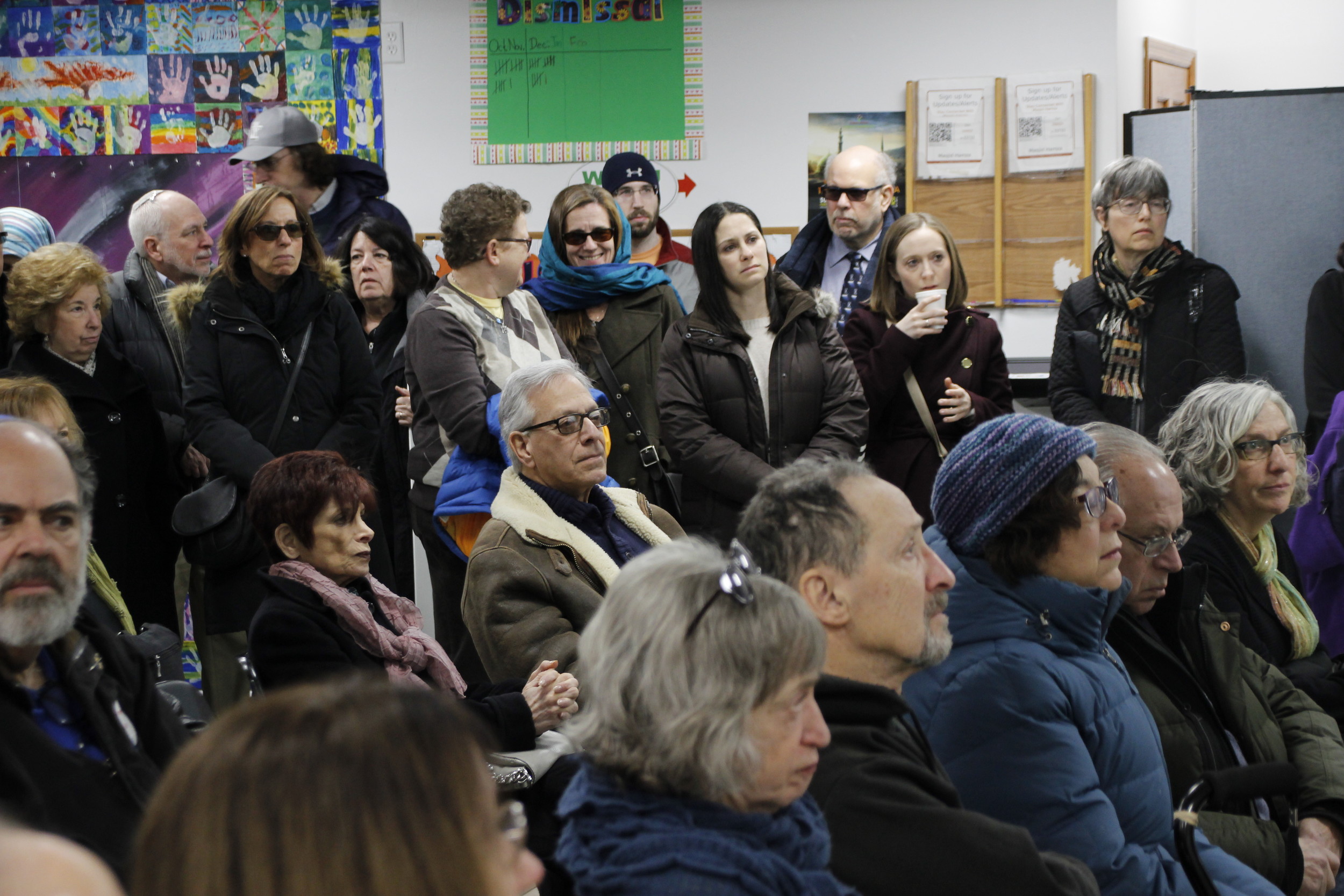At Valley Stream mosque, rabbis, congregants speak out against bias and discrimination

Leaders and congregants from several area synagogues visited Masjid Hamza Islamic Center of South Shore in Valley Stream on Feb. 3 to condemn religious discrimination in all its forms, and to disavow President Trump’s immigration order — which has since been halted by a temporary restraining order.
“We are here because we are Jewish Americans,” said Rabbi Andrew Warmflash, of the Hewlett-East Rockaway Jewish Center. “Our families came to America as immigrants and refugees. We have experienced hatred and persecution for who we are and what we believe, and we are resolved to stand up against hate and intolerance when it is directed at us, or anyone else.”
People came from Rockville Centre, Hewlett, East Rockaway, Lynbrook, Malverne, West Hempstead, Oceanside, Valley Stream and Baldwin.
The two religions share many tenets and key figures. For example, Moses — the most important prophet of Judaism — is mentioned more in the Quran than any other individual. Even though they differ over precise interpretations of the text, the Hebrew Torah and the Muslim Quran share a great deal of narrative. And Jews and Muslims also share many fundamental religious concepts, such as the belief in a day of divine judgment. Muslims commonly refer to Jews (and Christians) as fellow “people of the book,” or people who follow the same general teachings about how to worship God.
Despite their religious similarities, the two ideologies have clashed in the Middle East for decades. After the 1948 Arab-Israeli War, 12 more wars were fought between the Arab states and Israel over territory, and these conflicts weakened Islamic-Jewish relations. None of that tumultuous history was evident at the mosque on Friday.
About 50 people packed the basement of the mosque ahead of its afternoon prayer services, as Jews and Muslims mingled over coffee and doughnuts.
“Our government’s recent actions banning citizens from several Muslim countries and Syrian refugees from entering our country is inhumane and discriminatory,” Warmflash said. “It violates the Constitution of this country. We believe it does not represent who we are as Americans and the principles [on] which this country was founded.”
Trump’s order barred citizens of seven Muslim-majority countries — Iran, Iraq, Libya, Somalia, Sudan, Syria and Yemen — from entering the United States for 90 days, and suspended the U.S.’s refugee system for 120 days.
U.S. District Judge James Robart, in Washington State, named to the court by President George W. Bush, issued a nationwide temporary restraining order that lifted the travel ban late last Friday. Robart issued a seven-page ruling on the merits of the state’s case in which he said the executive order “adversely affects the state’s residents in areas of employment, education, business, family relations and freedom to travel.”
Rabbi Art Vernon, of Shaaray Shalom in West Hempstead, said that all Americans need to think of themselves in broader terms as the country becomes more diverse.
“It’s time to expand the religious definition of America to include Muslims,” Vernon said. His congregation is creating a project called Children of Abraham, to promote understanding at churches, synagogues and mosques and to teach the shared history of Islam, Judaism and Christianity.
Rabbi Sandra Bellush, of Temple Am Echad in Lynbrook, said that she came to the United States from South America to pursue opportunities that the country offered.
“It’s really an honor to be here to support our Muslim neighbors,” Bellush said. “To show that bigotry and hatred based on religious faith is something we will not tolerate in our community.”
Cantor Nancy Dubin, also of Temple Am Echad, approached the lectern and asked if it was all right if she sang, and then performed “Salam” by Mosh Ben Ari. Congregants who knew the song joined in.
Rabbi Elliot Skiddell, president of the Long Island Board of Rabbis and a leader at Central Synagogue Beth Emeth, in Rockville Centre, said that the Jewish community would continue to support Long Island Muslims in the face of discrimination.
“We are all here today together, but it’s not just today,” he said. “As long as this takes, or as long as we need to, we will always be standing together.”

 49.0°,
Fog/Mist
49.0°,
Fog/Mist 




